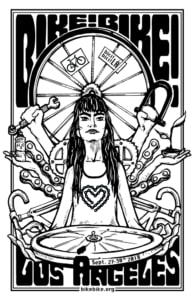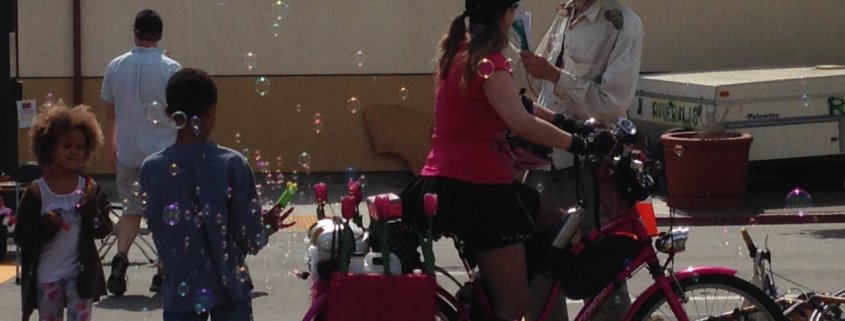Leading from the Least, Learning the Most
The largest international gathering for people involved in community-centered bicycle projects came to Los Angeles this year; CalBike sponsored Bike!Bike! to support 4 days of workshops, social networking, group rides, camping, and collaboration with some of the world’s most passionate bike mechanics, advocates, activists, and leaders. What makes Bike!Bike! so unique is the bottom-up, low-budget and Do-It-Yourself (DIY) approach most bike community bike shops, collectives, and cooperatives take. These type of bicycle collectives and cooperatives are often not-for-profit volunteer-run organizations aimed at providing a space for people to learn about the bicycle and build community around promoting sustainable transportation and alternative cultures to our automobile dependencies.

CalBike is a huge fan of community bike shops. Especially in neighborhoods that can’t support for-profit bike shops, community bike shops are often the first and only option for many socially marginalized communities and individuals to go to for repairs, maintenance, or just getting started on using one of the most affordable and cleanest mobility options. BikeBike! served to support those shops and to promote the values of equity, justice, inclusion, and self-empowerment that undergird most existing community bicycle projects.
Much of the credit for organizing Bike!Bike! Is due to the members of Los Angeles’ own Bicycle Kitchen/La Bicicocina, a well-respected community bike project and establishment that teaches people to work on their own bikes. It’s that simple. The Bike Kitchen is a truly DIY bike shop, workshop, and education space that centers the bike as a legitimate form of transportation.
But biking on our city streets isn’t always safe and accessible to everyone, especially for low-income communities, for Black and Indigenous communities and communities of color, for Trans, queer, and gender non-conforming communities, and for our youth and elders. So community bike shops are often filling an important vacuum for fostering new riders, while also strengthening the broader bicycle movement from below.
Community-run bike cooperatives recognize the gap they fill by often complementing the major limitations to traditional bicycle advocacy. Bike cooperatives are often doing important work developing alternative narratives that directly engage and recruit a diversity of “other” or new bicyclists. They play an important role as a counter to some mainstream advocacy that is focused more on elite strategies that exclude those without societal, cultural, racial, class, and gender privileges.
Bike co-ops often play an important role in promoting the bicycling subculture as an important arena of autonomous politics that mainstream bike advocacy just doesn’t encapsulate. Bicycling is for many of its adherents both a symbolic and practical rejection of one of the most onerous relationships capitalist society imposes: car ownership. This rejection, more specifically, may be rooted in subverting mainstream consumptive society. The bicycle has become a device that connotes self-emancipation, as well as artistic and cultural experimentation. Again, bike co-ops complement traditional advocacy by moving away from the focus on building top-down political will for infrastructure and working behind the scenes to sec
ure legislative wins, rather than integrating the broader cycling public. Community bike shops, co-ops, and collectives fill an important space that builds demand for biking, alongside more “supply-side” interventions such as infrastructure projects.
These same spaces better allow local residents to become empowered both economically and politically in ways that impact broader decision-making processes. This puts local residents in community leadership roles over its own bike development projects rather than being folded into existing projects brought in by outside interests.
However, there is no major institutional support for these type of efforts. Bike!Bike! is an ongoing effort to build support. But often, and more importantly in the short-term, events like Bike!Bike! are for building international, national, state, and local solidarity. And for sharing and learning from others in the movement, doing the hard work that cities refuse to do or doing the work that is neglected and deemed insignificant. This work provides a counter-narrative or argument against governmental priorities which are meant to “improve” or“better” communities with new infrastructure. Smaller bike cooperatives are often ignored by decision-makers who habitually miss the human element of residents struggling to make a world of their own at severe odds which have always been designed to exclude them. This is where Bike!Bike! comes in and our full-fledged support for activities and policies we are not always so well-positioned to push.





 Ian Sane
Ian Sane